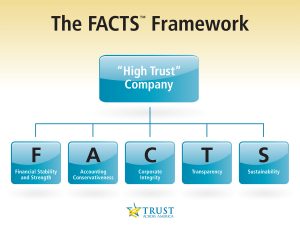Question: If elevating organizational trust improves profitability, what stops senior executives from placing trust at the top of every business agenda?
Possible Answers:
- Trust is taken for granted or overlooked
- No silo “owns” trust so there is no budget
- Trust is soft and intangible
- Trust is not regulated
- External stakeholders are not demanding trust
- Executives believe that the business case for trust does not exist
- Organizational trust is completely misunderstood by just about EVERYONE
I recently posed the following questions to two senior executives at Fortune 500 companies:
Question #1: How is the level of trust in your organization?
- Answer from Executive #1: We have no trust issues
- Answer from Executive #2: We have no trust issues
Question #2: How do you know?
- Answer from Executive #1: Our revenues are exploding and we are expanding globally.
Note: I call this the “shareholder value” answer.
- Answer from Executive #2: Weren’t you listening during my speech? Our CSR and philanthropy programs are some of the best out there.
Note: I call this the “corporate window dressing” answer.
Ask almost any C-Suite executive these two questions and most likely you will get a similar answer.
Now let’s take a deeper dive
Executive #1 works for one of the largest health insurers in the world. Over 500 employees posted the following comments on Glassdoor.com. Overall, the employees rate the company a 3 out of 5.
- Horrible health benefits (the company is a health insurer)
- Huge cronyism issues
- Tons of corporate politics and red tape
- Poor appraisal process
- High stress
- It paid the bills
- Management by fear
- High turnover rates
Executive #2 works for one of the world’s largest pharmaceutical companies. Let’s see what over 200 employees have to say about their work experience. Overall, the employees rate the company a 3 out of 5.
- We played cards to reduce our workday from 8 to 6 hours
- Employees not allowed to talk to each other
- Too many company meetings and policies
- No decent leadership
- No morale
- Leaders are inept
- Bureaucracy and never ending process
Do these sound like “high trust” companies to you? Do perceptions match reality?
Trust Across America has been researching and measuring the trustworthiness of the 1500 largest US public companies for almost eight years via it’s FACTS® Framework. This, by order of magnitude, is the most comprehensive and fact-based ongoing study on this subject. We analyze quarterly and rank order by company, sector and market capitalization. We are particularly interested in tracking individual companies and sector trends over time.
While Trust Across America continues to make the business case for trust, it remains quite common for perceptions of organizational trustworthiness to remain misaligned with reality. Most times, the trust “wake up call” and the residual fallout unfortunately occur AFTER a crisis, and as a direct result of a blatant abuse of stakeholder trust. Just ask Wells Fargo, Mylan and Volkswagen.
It’s a lost opportunity when business leaders wear their trust blinders while the evidence mounts not only for the business case but also the financial one. Trust works.
Barbara Brooks Kimmel is the CEO and Cofounder of Trust Across America-Trust Around the World whose mission is to help organizations build trust. She also runs the world’s largest global Trust Alliance and is the editor of the award- winning TRUST INC. book series. In 2017 she was named a Fellow of the Governance & Accountability Institute, and in 2012 she was recognized as one of “25 Women who are Changing the World” by Good Business International. She holds a BA in International Affairs from Lafayette College and an MBA from Baruch at the City University of NY.
For more information visit our website at www.trustacrossamerica.com or contact Barbara Brooks Kimmel, CEO and Cofounder
Barbara@trustacrossamerica.com
You may also join our Constant Contact mailing list for updates on our progress.
Purchase our books at this link
Copyright 2017, Next Decade, Inc.




Recent Comments